
Publisher:
Bonnie King
CONTACT:
Newsroom@Salem-news.com
Advertising:
Adsales@Salem-news.com

~Truth~
~Justice~
~Peace~
TJP
Jun-05-2011 15:54

 TweetFollow @OregonNews
TweetFollow @OregonNews
Gone are the Days
Kenneth G. Ramey Salem-News.comSalem-News.com writer Ken Ramey discusses life in the Great Depression.
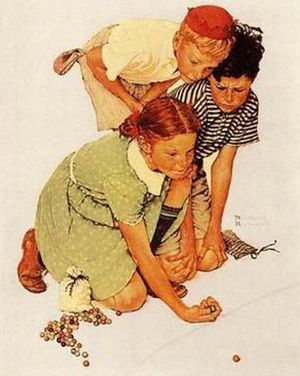 'Marbles Champ' by Norman Rockwell |
(PASO ROBLES, Calif.) - Not long ago rugged individuals performed tasks on a daily basis; work that has virtually been eliminated by means not then available.
The Republican Tea Party Contingent speaks as if everyone, except the rich, should perform as if they were self sustaining individualists as in Colonial times. It simply is not possible in the broadest of today’s lifestyle.
But until the end of WW-II rugged individualism was a necessary fact of life for many who the Depression made glad for any opportunity. 
The Great Depression of 1929 reduced men, and women too, to lives of survival whose success often was due as much to friends and neighbors as to themselves when circumstances dictated how one had to live. The War eventually provided work and opportunity to overcome, but times were tough till then. Those whose circumstances were dire for reasons they could not control suffered most.
In the case of my family, mother raised four boys alone because her husband deserted her and contributed virtually nothing to our welfare. The oldest boy had Tuberculosis and was cared for at home till he died a year later in 1943 prior to his 19th birthday; our father attended the funeral but refused to pay for his son’s funeral or cremation. their second son was spastic from birth, was a cripple, deaf and unable to speak; he died in his 25th year in a State Institution also of Tuberculosis. My other brother is eighty-three and I am now eighty-two years old. Go figure.
In his major works, Charles Darwin's discusses hybridizing and mongrelizing as a result of inbreeding and the probable results in progeny. Curiously, Darwin married his first cousin, had children and never a problem. My mother and father were first cousins who together produced four children, all boys of which I am the youngest. But the product of inbreeding according to Darwin do not always live long; my oldest brother died before his nineteenth birthday. Inbreeding may also result in what Darwin speaks of as a mongrel. My second brother was spastic from birth, and died in 1955 of tuberculosis in a State Institution. 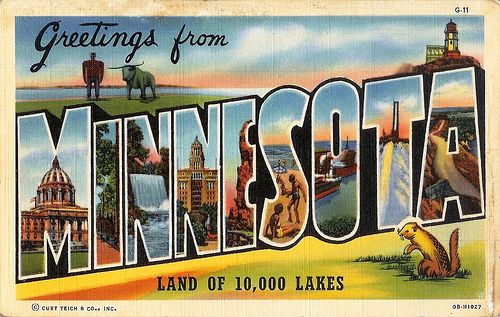
A product of inbreeding mated to an untarnished variant will produce virtually normal progeny allowing for traits passed from one generation to the next via the genetic pool. Some attitudes appear to be recognizable through several generations of my family beginning with my paternal grandfather, my father, my brother, and even my son. My daughter suffers from mild bi-polar symptoms and takes medicine for her disorder. Her first child, a daughter, has two children, the first a boy of unusual talent who has subsequently been diagnosed as being autistic. Her daughter is absolutely normal.
I barely knew my father who confessed he was greatly influenced by his father whose character left something to be desired, and was well regarded by members of the family to whom he lied, but whom he also cultivated. This is the character that got passed along to my dad, who died in 1996, and to my brother who, for reasons best known to himself, asked my son not to tell me, and he didn't. Except for sympathy cards I received from cousins in Washington State, I might never have been informed.
Before my brother died in April of 1943; I was sent with my cousin to Minnesota in March where I lived with my uncle, his wife and four children; Joyce who accompanied me to her father’s farm, was nineteen, I turned 14 on March 13th and was about of an age of the three boys. I lived and worked with them until August when I was sent home to Oakland, CA alone by train pulled by a steam engine. It took five days. 
The five months in MN were a life-altering experience for me beginning with my first breakfast where, when asked what I wanted, I said “an egg.” The table was set with at least a dozen eggs each dropped in a cup of a muffin tin in with milk, then baked. There also was oatmeal with sugar and real cream, and cold cereal too. Bread was baked every other day in the wood burning stove. Uncle was steward of the milk pitcher and filled every empty glass presented to him, even when I asked for just half a glass because, he said, I didn’t say which half I wanted. Breakfast ended with fruit and real cream. Before I left, I was eating as much as my cousins. I was a runt when I arrived but had grown six inches and added muscle to what heretofore had been felt by others to be a delicate frame.
At first I was not allowed to do more than familiarize myself with the surroundings and make friends with their dog. The barn, had a loft from which twenty-two milk cows were tossed hay when being milked. Below was the separating room, across from the stanchions where half the cows were milked; the other half were milked in the reverse barn; milking machines being the method du jour There was a pen for newborn calves too, all of which died when I was there, but their moms produced an abundance of sweet milk, after uncle taught them to accept the milking cups without kicking. A double horse stall faced away from the action next to the granary of ground oats and barley fed to cows selectively to enrich their milk‘s butterfat. My uncle kept a record of what was fed to each cow.
Then there were the pigs; the sows were about to bear young and they had to be thrown corn from a trailer next to their enclosure until they were transferred individually, when ready, to covered pens in which to farrow. Yearling calves and young steers were separated and were fed corn each day carried to them in a bushel tub. Milk cows were turned out to pasture each day to feed on sweet clover until encouraged to return to be milked. Jack and Nellie, the two horses, often were turned out with them.
When finally I was put to work, my job was to take the four o’clock lunch, consisting of milk and peanut butter sandwiches to the field where my uncle and cousins were working. Then I was expected to bring the cows in to be milked. Lyle showed me how to catch the horses by squeezing their noses; then scrambling aboard as best I could, I’d ride Jack and Lyle rode Jenny to herd the cows toward the barn. Eventually I had to do it myself. Jack helped by nipping the laggards. 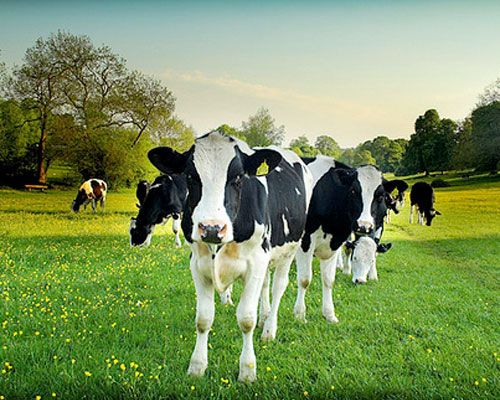
As I mastered each task, new ones were added until I was doing all the chores including milking all the cows and carrying their milk to the separator, but I never was allowed to separate the cream from the milk. The horses were put in the double head-first stall for the night, tails out, but with a manger in front into which I dumped a can of oats for each horse. Jenny was always the lady, but Jack, after I dumped his oats, would pin me to the side of the stall by resting his weight against me. It was his idea of a game and he wouldn’t let me out without a friendly argument every time.
As I said, I milked twenty-two cows, eleven in each side. I got to know them all, and what I found amazing was that they knew on which side they belonged, and also exactly which stanchion was theirs. If, when the cows were let in, a cow put her head in a wrong stanchion, the right cow would try to force its head in till the first moved over to its proper spot.
Because of this peculiarity, one could put out the grain for each in advance.
Being a clever fellow, I’d watched my uncle and knew how much grain he fed to each cow, and took it upon myself once to feed them, and caught a bit of hell as a result, until uncle realized I had fed them correctly. Lyle told me afterward that only my uncle was to do that job. OK. . .
I never seriously was involved in field work, but I was introduced to it at a time far different from today’s farming methods. Horses pulled the machinery; grain was cut by a binder which tied it into bundles that were left on the field in bundles. The bundles were then shocked by propping bundles against each other like an (A) where the grain ripened before being threshed. I left for home before threshing was done, and the corn was not ready to be harvested in August when I left, but not before I saw the Northern Lights; a totally memorable experience, at least to me. 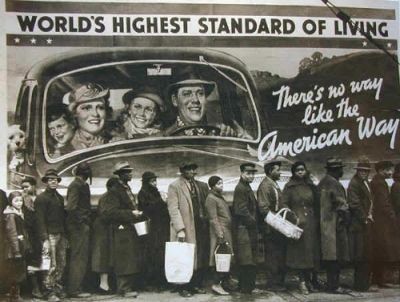
What was then considered a good life, really was, but since then great improvements have been made in the quality of many lives until today the pace of improvement is measured exponentially and so rapidly as to overwhelm those of us too old now to keep up.
Many jobs which once were prevalent no longer exist; modern methods eliminated them by more efficient and satisfactory means. Today, farms can be operated by one or two men using modern machinery, and still have time to help others for a price. Best of all out-houses became a thing of the past. 1943 was primitive compared to the modern farmhouses of today, but I confess there was romantic magic to the rugged lifestyle of old.
Back in Oakland, I resumed my schooling which in Minnesota was put on hold. I was held back a semester as a result. But as fortune would have it, it worked to my advantage and I can honestly say my year spent in the ninth grade was the best year in all my school experience. Mother had a job and we were off welfare after nearly ten years. When my brother next to me in age graduated from High School, he joined the Army which for him amounted to the same thing as my life-altering experience.
Because of the War, manpower was in short supply. Consequently, the owners of the Fuel and Feed saw in me an opportunity not to be missed.
I had turned fifteen in 1944 and had two and a half years of schooling to go, but I worked for them on Saturday and Sundays. It was a dirty job sacking coal, manure, leaf mold, sand, etc. and waiting on customers including carrying purchases to their cars. And for all this they conveniently neglected to pay me when due. So, when another opportunity came along, I was eager to accept it.
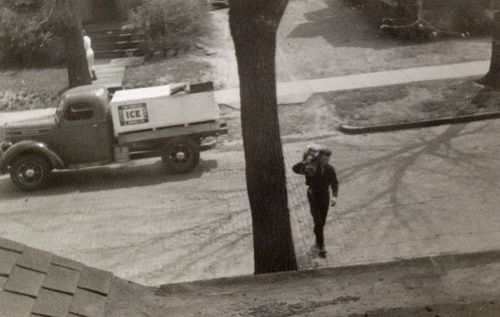 Ice delivery in the 1940's courtesy: Flickr |
Charlie, our iceman in the past; now the supervisor of drivers, sized me up and said he thought I could do the job as helper to some of the icemen. He’d pay me $1.00 an hour; no overtime pay. I was glad to have the money, but the school board said I had to be sixteen before I would be allowed to ride on the trucks, which I was doing, and even driving them; when Doc Falls age 64, and a prince of a fellow, got drunk. Charlie had to let me go but promised he would hire me again after I turned sixteen. I was not sorry for the turn of events, for ice is hard, cold and slippery, and I had mother pin a folded towel inside shirt over my right shoulder to ease the pain of carrying no more than 50# blocks of ice, my limit at the time. So, I rested and tended to my school work till the summer of 1945 when Charlie hired me again. By then I had obtained my driver’s license, too.
Charlie wanted me to have two uniforms which I had to pay for myself. I would continue to get $1.00 an hour with no overtime. Charlie assigned me to drivers who bought my lunch and sometimes gave me a few bucks too. I was apprehensive at first recalling how hard the work was when fifteen. To my amazement though, I discovered what was difficult for me then, no longer was, but I would have to work up to handling heavier weights which I did, finally being able to carry as much as 150# of block-ice up four flights of stairs, but that was nothing. I watched one iceman steal a three hundred pound block off the platform and run with it on his shoulder to his truck, and I was helper to another who could carry 400# of bag-ice at once using a thumb and little finger to support each bag. Then he would press each 200# side and put the bags on the bar from where he could more easily dispense their content. Unfortunately making a delivery like this to a basement in downtown Oakland, his heel slipped off a stair, injuring his back which put an end to his feat of strength as well as his job.
Retail iceman made deliveries to homes as well as to bars. cafes, restaurants, flower shops and even ships at times. In fact there was hardly an establishment that didn’t use ice as refrigeration or in drinks. We were busiest during the Holidays, Thanksgiving through New Years, and during the summer or when parties for any reason under the sun occurred. I drove “specials” for awhile during one summer, worked regularly on Saturdays and Holidays. My most curious delivery was to a Mortuary which ordered 300-pounds of bag ice to cover a corpse; a man who drowned on the 4th of July, whose body was not recovered till September. He was being shipped by train in a metal casket to his home back east. The body was in a bag of course, but I had nearly to kiss him each time I emptied a bag of ice which encased his body.
On another occasion I delivered bagged ice to a lawn party near the Claremont Hotel in Berkeley. Access was from the street and up a lot of stairs; it was a very warm day. There were three Coke chests loaded with beverage that had to be cooled, and that would take me six trips up with a 100# bag of bar ice; I nearly crawled on my hands and knees to get up each time. There was an ice cold glass of beer waiting to reward me each time I conquered the mountain, and did it taste good! But after two glasses I had to admit to these wonderful people that if they expected me to finish the job, I had better forgo the beer. They laughed, but got what they paid for.
The delivery I made to a Frat house in Berkeley was nearly the end of me. Icemen wore uniforms including caps, and when I scouted the house I saw a Great Dane frolicking with the boys in the backyard; I was parked on the street below. I had three 100# bags to deliver to the service porch in the rear. I managed to get two bags in the house before the dog spied me and charged. Suddenly I heard a lad shout, “take off your hat,” which promptly I did. The Dane slid to a stop, reversed course and I finished my delivery carrying my had in hand till I reached the safety of my truck.
In those days produce was shipped by rail cars with hoppers at each end. We iced the hoppers in Oakland, but I suspect the produce was loaded in Salinas to be delivered in the east. We used to elevate the ice to the top where two men directed 75# blocks into the two openings, one on each side which required the ice be thrown to the far side. while below 300# blocks were halved then quartered to be tossed on the elevator from the truck at a pace intended to keep the top men busy. 120# sacks of salt was added to enhance the cold at intervals. When one hopper was full, we moved to the other end if necessary to complete the re-icing.
A merchant ship docked in the estuary on the Alameda side wanted a delivery of ice in 300# blocks. I was given the ship’s name and instructions how to find it, and somehow I did. I pulled alongside the ship and went aboard to ask for directions. I was directed to the officer’s bridge by a seaman. I didn’t give it a second thought and bounded up the stairs where I met with a decidedly cool reception. My uniform was black as were the costumes of ordinary seamen, so before I could explain, I was asked “what the hell are you doing up here?” - an obvious case of mistaken identity. When I explained I just wanted to know where they wanted me to deliver the ice, all was peace again, and I was glad to be on my way.
The war was nearly over, but until it really was, domestic production was lacking. Consequently very few people had electric refrigerators, and virtually every one used ice. Afterward the ice business died on the vine. Mostly, our service was to residences not all of which were easy to serve. For the most part they were not a problem. But not all routes are equal as I was to discover when called upon to fill in for a driver; some deliveries could be formidable. The Berkeley Hills are known for its several, if not numerous estates overlooking the bay. Some are gated with dogs patrolling the grounds. I was glad I never had to serve some of them.
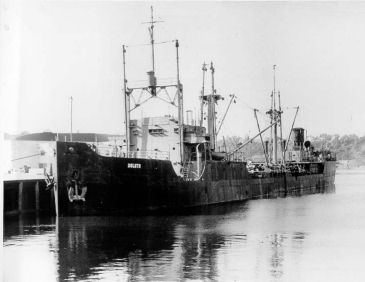 Oakland ship yards in the 40's. Coast Guard photo |
West Oakland was entirely different where I was required to serve some of its routes. Southern Blacks were flocking to Oakland where jobs were available in ship yards because of the war. As a result, the area near the ship yards and railroads was adjacent to West Oakland where incoming arrivals tended to locate. Space became so lacking that basements often were occupied, and in several instances I had almost to stoop double to reach the meter room where a man lived with just a bed and a small icebox. Pretty dismal to say the least.
Once in awhile someone might try to beat me out of a piece of ice by offering me a $100.00 bill for 25 pounds of ice, but when I deigned to take back what I delivered, coin of the realm was forthcoming saving us both the loss of time and effort.
I found these blacks to be as friendly as any people I ever met. Only once did a woman give me a hard time because she wanted me to serve her instead of her regular iceman. I tried to explain to her that she was not on my route, but finally I did serve her. I had turned the corner and was serving another house when I saw a big fellow in my wake, but all he wanted was to say what a mean lady she was, and that I was not at fault.
I have omitted much of what I might have written on these subjects, but should add that the romance of farming is not always a bowl of cherries. I watched my uncle cut alfalfa time after time only to watch it be rained on and have to be destroyed. I never did know if he was finally successful in harvesting a dry cut. Early in August a storm came through about noon with rain and hail so hard the barn could not be seen from the house. The corn was tall, but not yet ripe, but the crop was ruined when the hail stripped it. You see what I mean.
Just this May, 2011, over 400 people have died as a result of a swarm of Tornadoes of deadly force in the breadbasket of America. Large portions of Towns were leveled. The expense to residents may be more than they can bear, and the Government is getting involved in their recovery. Floods too have destroyed vast areas of farmland destroying crops and income. The oil spill in the Gulf of Mexico took a toll on the resident fishermen along its coasts. Rugged individualism has been replaced not only by what mother used to describe as “modern inconveniences,” but also necessity.
America has turned the corner and is looking to join the nations of the world in caring for their own. It is not to be ashamed of; it is as it must now be.
It would be nice if the troops were brought home from Iraq and Afghanistan to help where they can do a greater good, but it is not likely to happen so long as the Administration implies it prefers to secure America’s right to another foreign outpost. Do we really need it? Can we really afford it when our economy and deficit cry out for help? And can we ignore the need for regulations that so effectively controlled the avarice of persons who, since Republican Administrations removed them, have run rampant over the masses and brought our economy to the verge of collapse?
It is time to plan for a new America by recognizing how government must act to protect and help those of our people deserving of its attention rather than adding to the wealth of a new aristocracy the Party of which is the Republican Party of God and its Holy See of Evangelicals whose base is subservient to its will.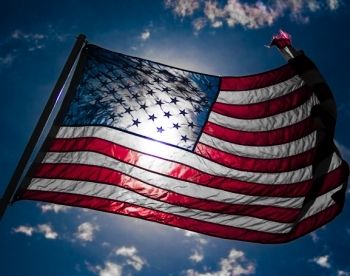
Not all the wealthy came by their riches dishonestly, but since the source of the wealth of all is derived from those whose service and spending contributed to it, why should it be presumed the rich have no obligation toward their benefactors? What better way to balance the books than by an appropriate tax code which is as fair to the middle class as it is to the upper?
Gen. Dwight Eisenhower when he left the White House warned that the Military Industrial Complex was a serious threat to America’s future, and Geo. W. Bush pushed the envelope to the extreme as he responded to the wishes of Evangelicals whose purpose was to advance their position in the hierarchy of the Republican Party of God. The Holy See is now the power which decides who and what is acceptable within the political realm, always with an eye to a future that includes its misguided concepts so long as it devolves to its political advantage.
The Party of God has moved so far to the right as to invite a response, less from the Democrats, than from the people themselves who can see where Republicans are taking the country. Not only seniors, but also their progeny stand to lose if together they cannot stem the flow of Republican desire to cut Medicare and Social Security. Better our troops should be brought home and, if necessary, be used to support nascent Arab nations showing a preference for Democracy where the American plow can be dipped into more fertile soil than Afghanistan and Iraq to help those who are trying to help themselves.

Since the end of WW-II, rugged individualism has been replaced by a new class of citizenry who make money less by brawn than by their brains. We exist in an intellectual world today, but also one in which Evangelicals try to convince their followers that they are the true Christians who do not question, and that intellectuals are instruments of the devil, because they do. Geo W. Bush did not question, but did as he was told, and was led to believe that “with Jesus in His heaven, all’s right with the world,” until Katrina hit New Orleans and proved him wrong.
It is not the kind of experience any of us should have to endure to know the truth which is readily available without the need to suffer the consequence of error, as did President Bush in the service of misguided Evangelists and their political followers of the Republican base. Jesus is not God any more than is Islam’s Mohammed. We have been taught to believe otherwise, and those who teach, or in whom we believe, have power over us.
Nature is as close as we can come to really knowing God and understanding what life is all about. The Church cannot solve human problems by acting as if it is God; by presuming to tell us what is right and what is wrong.
The fact is the world is overpopulated, and to denounce contraception and abortion as evil simply adds to the problem both physically and psycho-logically. Pro-Life advocates simply add to the problem. For women no longer have to become pregnant unless they choose to be, and by promoting contraception, abortions should be reduced. It is this sort of logic that lifts peoples above the level of others who exist in poverty and often despair.
But, back to Nature; tornadoes should suffice to teach that the best defense against them is a storm cellar; and high lands are best when flood or tsunami hit. The opposite may be true in case of fire. Each of us ought to prepare according to logic and common sense, just as it makes sense to use contraceptives to avoid pregnancy and abortion. The more you accept these facts, the closer you come to God. By preparing for the worst and hoping for the best, each one of us can determine our fate to a larger extent than ever. Rev. Huckabee would do well to introduce these truths in Arkansas.
I know not everyone is so lucky they can live where they want. Neither can I accept that it is God’s will that overpopulation be reduced by unexpected natural disasters. Earthquakes will occur; Haiti is an example, which may require we refine our thinking as well as building codes that should not permit persons to build in flood plains or on bluffs above eroding shorelines. To the extent we can, common sense and industry should decide our own destiny.
There is also the fact that people do not always possess the knowledge or the will to help themselves. Hurricane season is here again, and it doesn’t seem to me as if Haiti is anywhere near prepared for it. If a people has not prepared itself to survive, the efforts of outsiders can be of limited assistance at best. I cringe when I consider what could happen in Haiti this year, but I know also that it is just one area in the world where people will suffer like consequence because they must live where they cannot escape their predicament.
 Kenneth G. Ramey, Salem-News.com's Religion and Philosophy Writer, confronts the hard issues of politics and religion from a logical point of view that combines interesting insight with history into the truth, or lack thereof, that underlies the strengths and weaknesses of the Religious Right’s determination to use American politics for its own misguided, or selfish, interest. It’s rare for a writer to balance his writing between religious values and the secular guarantees of the Constitution and the Bill of Rights with the knowledge that Ken possesses, and to do it so effectively.
Kenneth G. Ramey, Salem-News.com's Religion and Philosophy Writer, confronts the hard issues of politics and religion from a logical point of view that combines interesting insight with history into the truth, or lack thereof, that underlies the strengths and weaknesses of the Religious Right’s determination to use American politics for its own misguided, or selfish, interest. It’s rare for a writer to balance his writing between religious values and the secular guarantees of the Constitution and the Bill of Rights with the knowledge that Ken possesses, and to do it so effectively.
Ken was born in Minnesota but was raised in California since 1932. He is the youngest of four boys raised by his mother alone during the dark years of the Great Depression. He Graduated from SFSU in the 1970s when in his mid-forties, majoring in Spanish North American History, and added three years of post-graduate study, much of it in Philosophy and Religion. We live at a critical time in history and believe Ken's views represent the view of many who are tired of the commercialism and false interpretations about religion today. Watch for Ken's articles on religion, philosophy, politics and history. View articles written by Kenneth G. Ramey You can email Ken at: darken1@sbcglobal.net
Articles for June 4, 2011 | Articles for June 5, 2011 | Articles for June 6, 2011

googlec507860f6901db00.html

Quick Links
DINING
Willamette UniversityGoudy Commons Cafe
Dine on the Queen
Willamette Queen Sternwheeler
MUST SEE SALEM
Oregon Capitol ToursCapitol History Gateway
Willamette River Ride
Willamette Queen Sternwheeler
Historic Home Tours:
Deepwood Museum
The Bush House
Gaiety Hollow Garden
AUCTIONS - APPRAISALS
Auction Masters & AppraisalsCONSTRUCTION SERVICES
Roofing and ContractingSheridan, Ore.
ONLINE SHOPPING
Special Occasion DressesAdvertise with Salem-News
Contact:AdSales@Salem-News.com


Terms of Service | Privacy Policy
All comments and messages are approved by people and self promotional links or unacceptable comments are denied.
Autism June 7, 2011 10:16 pm (Pacific time)
Two concurrent sentences stand out to me. First, you label a child as autistic, and then the next sentence, in contract, declares the other child to be "normal". Does this imply that the autistic child is abnormal? Thanks, People That Are Unfairly Labeled
YAY June 7, 2011 10:14 pm (Pacific time)
You know what I would like? More articles like this one regarding religion and politics on the Internet! Sincerely, No one.
The Internet June 7, 2011 10:09 pm (Pacific time)
Your genetic assumptions are incorrect. Regards, Science
Colli June 5, 2011 7:53 pm (Pacific time)
Excellent writing and very interesting Ken. I just wish your perception of the Republican party being a stand-alone rat in the corn-crib. From what I have seen, there are numerous rats from both sides of the political aisle infesting the corn-crib. Colli
[Return to Top]©2026 Salem-News.com. All opinions expressed in this article are those of the author and do not necessarily reflect those of Salem-News.com.